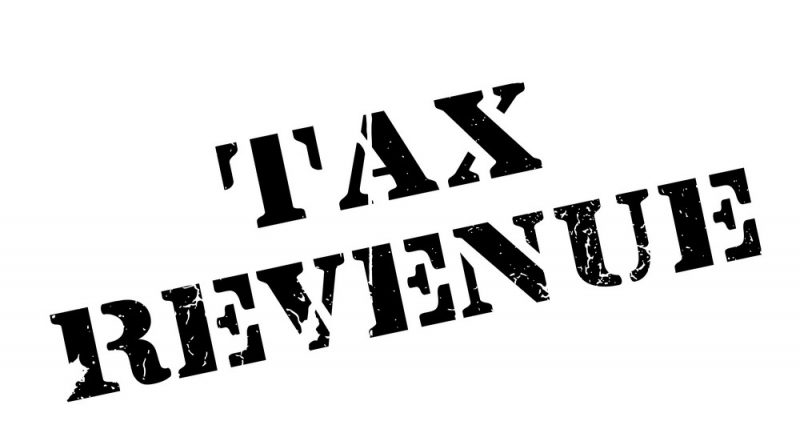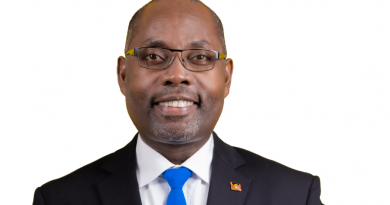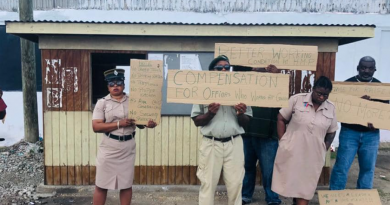Finance minister expects tax revenues to reach $1 billion in 2024, with new ABST rate yielding $414 million
Prime Minister and Minister of Finance Gaston Browne has
presented a $1.3 billion budget for 2024, representing 17.1 percent
of the country’s Gross Domestic product (GDP).
His presentation on Friday, December 15 – which lasted for more
than two and a half hours – was themed “Securing our Future
through Enhanced Fiscal Responsibility.” In it, Browne said that
budget 2024 forecasts an overall deficit of $80.2 million or 1.25
percent of GDP, and a primary surplus of $51.8 million or 0.8 percent
of GDP.
This, he claims, “is a significant improvement over the projected
fiscal outturn for 2023 and is consistent with the path laid out in our
medium-term fiscal strategy.”
Further, the Government has budgeted for total revenue and grants
of $1.2 billion or 18.9 percent of GDP this year, while the total
expenditure of $1.3 billion excludes amortization payments, which
amount to $569.5 million or 8.9 percent of GDP.
He says the Government’s net financing requirement is $649.7
million, or 10.1 percent of GDP. And in order to meet the net
financing requirement for the 2024 Budget, he says, the
Administration will rely primarily on issuing securities on the
Regional Government Securities Market.
These will amount to $250 million, while the disbursement of loans
and advances will amount to $210 million.
In addressing the income side of the budget, Browne says recurrent
revenue is projected to be $1.19 billion, or 18.5 percent of GDP, of
which tax revenue is $1.0 billion, or 15.7 percent of GDP. Non-tax
revenue is budgeted at $176.9 million or 2.8 percent of GDP, he adds.
However, even with revenue reforms, the finance minister says that
tax to GDP, including organic-revenue growth, will increase only by
0.7 percent – to 15.7 percent.
And even with this, he claims that Antigua and Barbuda will still
have the lowest tax-to-GDP ratio and revenue-to-GDP ratio within
the region.
Browne says the $219 million in additional revenue from recurrent
sources will be achieved through a combination of increased
economic activity, increased Citizenship by Investment (CIP)
receipts, and the impact of the revenue reforms to be implemented
in 2024.
The major contributors to tax revenue are direct taxes of $156.5
million and indirect taxes of $853.1 million.
Direct taxes include corporation tax, property tax, and the
unincorporated business tax, which account for $108.3 million,
$39.6 million, and $8.6 million respectively.
Indirect taxes, inclusive of the Antigua and Barbuda Sales Tax
(ABST), are forecast to yield of $413.6 million, with the 2 percent
increase from 15 percent to 17 percent.
Browne is anticipating that recurrent expenditure will reach $1.1
billion, or 17 percent of GDP, in 2024, with the largest component
going to pay wages and salaries, which are budgeted at $461.1
million.
This will include a 9 percent salary increase for central government
employees at a cost of $32 million, Browne says, completing the
promised 14 per cent increase, and will take effect on January 1,
2024.
Browne says the budgeted amounts for the other recurrent
expenditure items are Goods and Services – $210.6 million; Interest
Payments – $131.9 million; Transfers – $295.6 million.
Additionally, pensions and gratuities amount to $74.9 million;
employer contribution to Social Security and Medical Benefits to
$47.9 million; and $38.4 million in transfers to the Sir Lester Bird
Medical Centre.
The Government has estimated that a sum of $130.6 million of the
$196.3 million capital budget will be used for infrastructure
development, of which $82.8 million is for road rehabilitation and
$33.5 million for building repairs and maintenance.
In order to ensure effective fiscal discipline, the ministries and
government departments must be responsible and prudent in the
use of the Government’s limited resources, Browne says.
Government agencies, he claims, will be held to greater
accountability for the management of their allocations to yield
better value for money.
As he presented the budget – which was being viewed by fewer than
350 persons online – PM Browne announced that the Cabinet had
approved up to a 14 percent increase for government pensioners.
This, he notes,” is in acknowledgment of the challenges faced by our
retired public servants due to escalating prices over recent years.”
Appearing to take a page out of the budget presentation made by St.
Kitts & Nevis Prime Minister Timothy Drew, Browne said these
persons played pivotal roles in shaping the country, and it is his
government’s duty to provide them with the means to live
comfortably and with dignity.
He says that a committee has been assigned to develop a plan for
implementing the pension increase in 2024.




